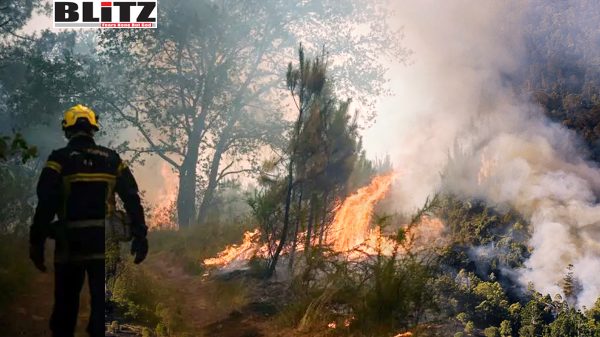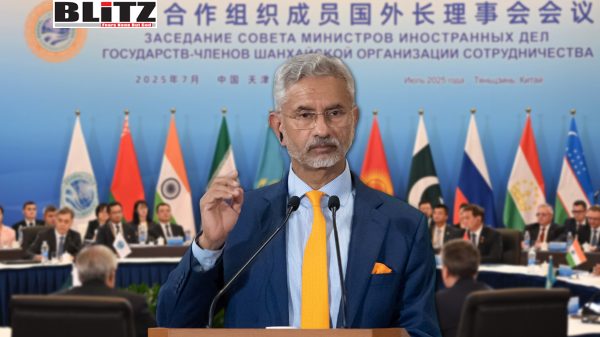Mediterranean wildfires signal dire climate crisis demanding urgent global action
- Update Time : Saturday, July 19, 2025

The Mediterranean – once a symbol of serenity, history, and breathtaking beauty – is being steadily transformed into a crucible of climate catastrophe. From the pine-clad coastlines of southern Turkiye to the hills of Greece, from the lavender fields of France to the war-scarred valleys of Syria, the region is under siege by unprecedented wildfires. These fires are not isolated accidents of nature, nor are they random events caused by mere misfortune. They are manifestations of a deepening global climate crisis – a crisis that is hitting the Mediterranean harder and faster than almost anywhere else on Earth.
In recent years, the frequency, intensity, and duration of wildfires in the Mediterranean basin have surged alarmingly. Thousands of hectares of land have been scorched. Once-thriving forests – some centuries old – have turned to ash within hours. Wildlife has perished in droves. Towns have been engulfed. Tourists have fled, and local residents have lost not only their homes, but often their sense of safety and future.
Emergency services are struggling to keep up. Firefighters are stretched thin, working day and night in grueling conditions made worse by sweltering heat, high winds, and bone-dry vegetation. In Turkiye alone, the summer wildfire season has grown more destructive each year, with dozens of blazes breaking out simultaneously across multiple provinces. The scenario is similar in Greece, where temperatures have soared above 45°C and fire fronts extend for miles across rural and urban landscapes. France and Italy, too, are not spared, as southern regions grapple with heatwaves and tinderbox conditions that spark fires with terrifying ease.
This is not simply bad luck – it is a scientifically recognized trend. According to climate researchers, the Mediterranean is one of the planet’s most vulnerable regions to the effects of global warming. The region has already surpassed the critical threshold of 1.5°C of warming above pre-industrial levels – and is heating up around 20% faster than the global average. This escalation in temperature has led to a chain reaction of environmental degradation: longer droughts, reduced rainfall, dried-out soils, and degraded ecosystems. Together, these create a perfect storm for fire ignition, expansion, and devastation.
The ecological damage is staggering. Ancient forests that have stood for hundreds, sometimes thousands, of years are being incinerated in mere days. These forests are not just trees – they are rich ecosystems teeming with life, home to endangered species and vital pollinators. Their destruction sends ripples throughout the biosphere, undermining biodiversity, collapsing food chains, and destroying natural carbon sinks that help regulate the planet’s climate.
Soil health is also deteriorating rapidly. When vegetation is lost, the soil becomes vulnerable to erosion, and when rains do eventually arrive, the water rushes over the surface, increasing the risk of floods and landslides. What follows is often a secondary disaster – not of fire, but of water, mud, and destruction.
The human toll is just as harrowing. Dozens of people have lost their lives. Thousands have been displaced. Entire communities are being uprooted. Mental health issues among survivors are soaring, as are respiratory ailments linked to smoke inhalation and extreme heat exposure. Healthcare systems, already burdened, are forced to respond to escalating climate-related emergencies ranging from heat strokes to asthma attacks.
Economically, the region is suffering immense losses. The Mediterranean is one of the world’s most visited tourist destinations. Tourism is a cornerstone of GDP for countries like Greece, Italy, Spain, and Turkiye. But travelers are increasingly wary of destinations plagued by uncontrollable fires and smoky skies. Cancellations rise, revenues fall, and small businesses dependent on seasonal tourism struggle to survive.
Agriculture, another critical sector, is under siege. Farms are burning. Olive trees, vineyards, citrus orchards – many of them passed down through generations – are being lost to flames or rendered unproductive due to drought and heat stress. Crop yields are shrinking, food prices are rising, and farmers are watching their livelihoods disappear.
All this paints a grim picture of a region caught in a loop of destruction. But worse still is the prospect that these events may not remain anomalies. If emissions continue unabated and global temperatures climb, the Mediterranean could face a future where such disasters are the norm. What was once an exceptional crisis could become an annual ordeal. Under such pressure, nations may experience population displacement on a massive scale. Climate refugees could flood urban centers, placing further strain on housing, healthcare, infrastructure, and social cohesion.
Governments must take decisive action – not tomorrow, but now. First and foremost, climate adaptation must become central to national strategies. That means building capacity in fire prevention and response. Land management techniques must be modernized to clear flammable underbrush, reforest burned areas using fire-resilient species, and maintain biodiversity. Emergency response services must be strengthened with better funding, modern equipment, and intensive training programs.
Early warning systems are also crucial. Technology can play a transformative role in mitigating future disasters. Countries should invest in satellite monitoring, remote sensors, and communication systems that provide real-time data and alerts. These tools can help detect fire risk early and ensure communities are prepared before disaster strikes.
Urban planning must evolve to reflect the new climate reality. Building codes should be revised to reduce fire risk, especially in forest-adjacent settlements. Public awareness campaigns are vital to educating citizens about how to prevent wildfires and how to respond when they occur.
Yet, the responsibility cannot fall on Mediterranean countries alone. Climate change is global – and so must be the response. The international community must offer not just words of solidarity but concrete support. Financial aid, technical expertise, and climate technology transfer are all needed urgently.
Wealthy nations, particularly in the Global North, bear a special responsibility. These countries are the primary historical emitters of greenhouse gases. Their development came at a cost to global environmental stability, and justice demands they now contribute meaningfully to the adaptation and recovery efforts of nations bearing the brunt of their emissions.
International climate funds must be made accessible – and fast. Too often, aid is bogged down in bureaucracy, blocked by political considerations, or tied to debt-creating loans. What is needed are grants, not burdens. Simplified processes, direct partnerships, and trust in local capacities can ensure that help arrives when and where it is most needed.
Universities, scientists, and policymakers across borders must collaborate to create better models for fire prediction and drought response. Green technology, such as solar-powered irrigation systems and resilient crop varieties, can reduce dependence on fossil fuels while helping communities withstand future shocks.
This is not a question of charity – it is one of survival, and of shared destiny. Every hectare of forest preserved in the Mediterranean helps mitigate global climate change. Every successful fire prevention effort contributes to global stability. Cooperation, not isolation, is our best defense.
The wildfires now raging in the Mediterranean are not isolated incidents. They are warnings – stark and searing. They are nature’s response to a global imbalance created by human hands. Unless we act urgently, the Mediterranean’s current agony could become a template for disasters across the globe – from California to Australia to the Amazon.
In the end, this is not merely a Mediterranean crisis. It is a global reckoning. And it demands a global solution.










